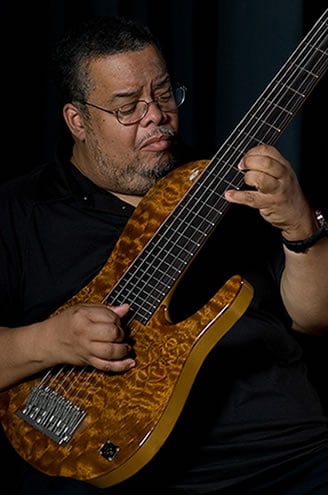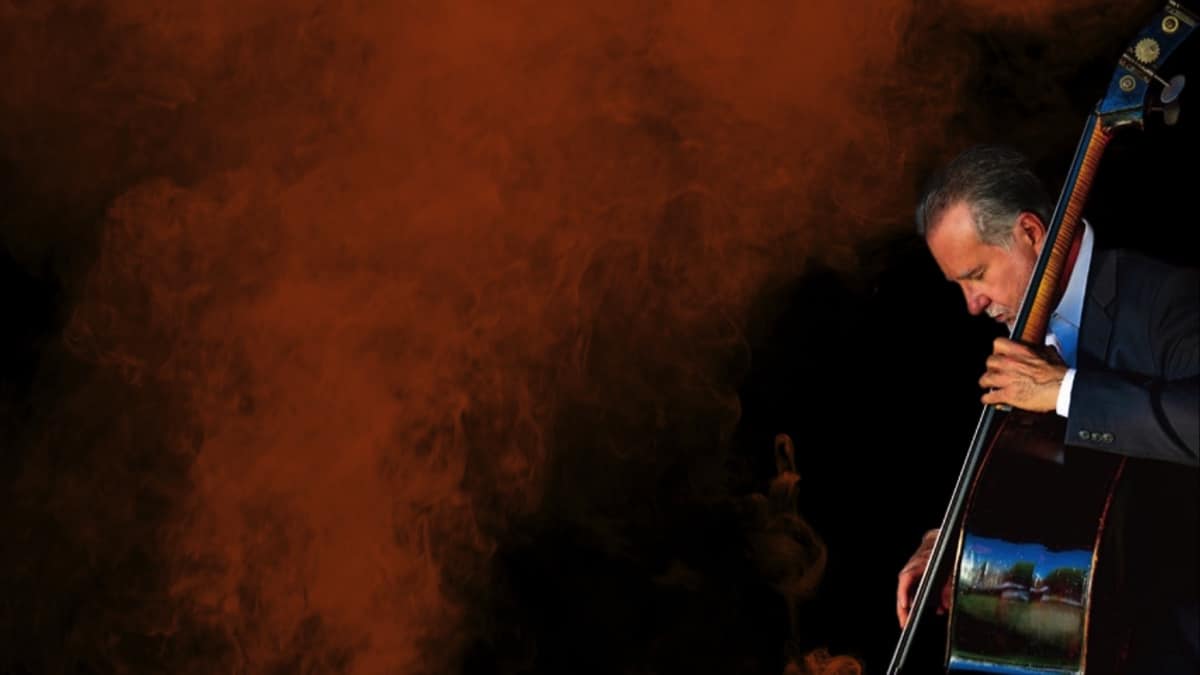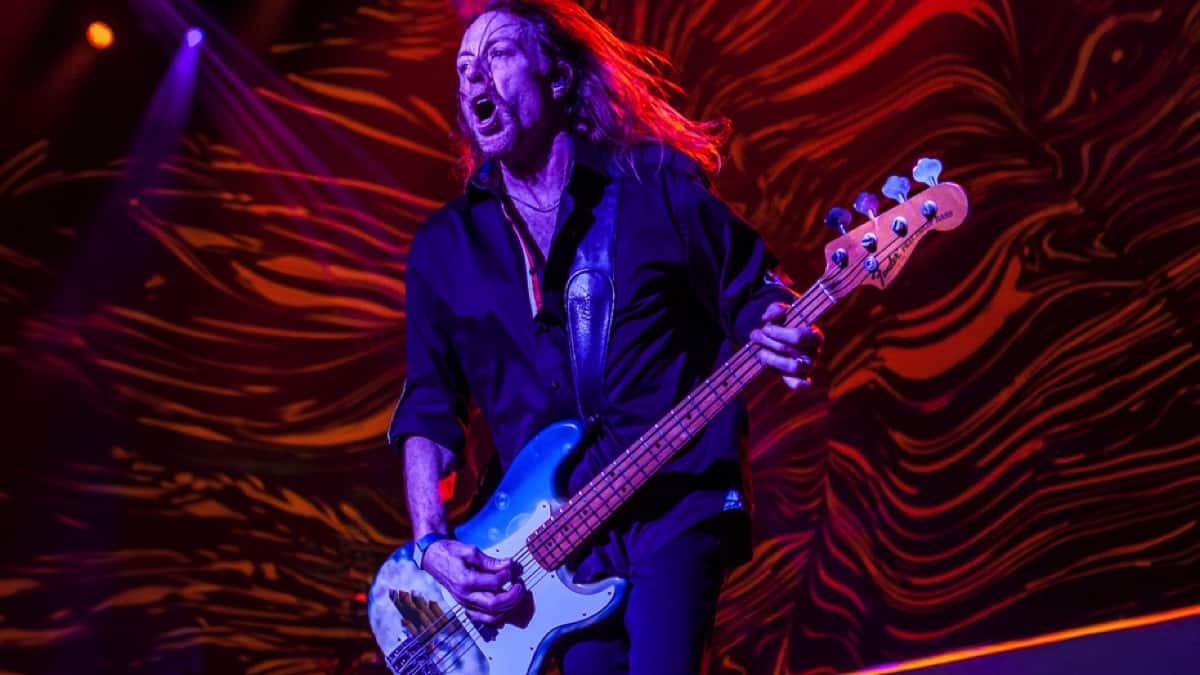Cover
Bass Musician Magazine: Apr/May 2009 Issue Featuring Anthony Jackson

The point that I’m making is that it’s not a set of rules. There “is” a certain amount of taste involved. You try to recognize who you are and who you’re playing with. If you know the person who’s doing the writing, “that” can give you a clue as to what you can do. And of course there are times when my only modifications to music are those of touch and phrasing, things that most people don’t notice until someone else tries to do it, and they realize something is missing. The same notes are here in both cases, but it’s not the same. And those are the little things we try to learn to do as performers, which lend personality, and character, and individuality to what we do.
These are aspects of a sublime expression that people just can’t put their finger on without a lot of analysis. They may not know what it is, but they are aware when it’s missing. It’s the way toward, unfortunately, a great deal of anonymity, of people essentially saying, for example, I love the way Anthony Jackson plays, but I’m not sure why. It just works when he does it. So that’s sort of what lies behind all of this. It’s trying to make the music better, hopefully, through my own contribution, and I’ll do that if it’s asked for, and accepted. But even if it’s not, still being able to put your mark there, putting some aspect of individuality that brings more of the music out even when nobody really knows what’s going on is what I strive for.
Jake: Do you feel that door is open most of the time with the artists you’ve been working with? I remember a story from way back when you were recording a record for Chaka Khan, and I believe Arif Mardin was producing, and they granted you the opportunity to go back and re-record your tracks if you so desired.
Anthony: Yes, they gave me three months.
Jake: Is that strictly a luxury of the past, or do you feel that kind of creative door is still open to you or other players under certain circumstances these days?
Anthony: Well, consider this—here’s a good example of what’s going on and what you can find yourself involved in. In the case of this particular record, we put down rough tracks, and I was supposed to do the whole record, but I had conflicts. So I shared the Naughty album, which was Chaka’s second record, with Marcus Miller, Willie Weeks, and Will Lee. I was on most things, but I didn’t do them all. And for the things that I knew I was on, we had acceptable rhythm tracks, in fact everybody loved what they did, except for me. For whatever reason, I knew that there was a lot more that I could be doing, not necessarily more in terms of playing more notes, but simply a more focused and refined approach. It was the first time I was in this position. I asked both Arif and Chaka, who I was very close with, if I could redo my tracks, and they said go ahead, take your time, recompose your parts—-we don’t think you need to, but go ahead. We’ll call you when we’ve done everything else and we’re ready to mix.
And I found something very, very interesting happening. For most of the alterations that I made, not all, but most, I had solved problems, which is the only way I can describe it. I listened to one of the redone parts while I was driving in my car one night and I thought, you know, this is really not what I thought it would be. There’s something else going on there. I realized that I had been confronted with problems. They were problems in my performance, problems in my conception. And what made this album so important to me was it was the first time that I solved musical problems in a way not directly related to anything I had done before. Basically what I’m saying is that I remember sitting in the car thinking, so this is it—this is what a style is. I remember going, wow, that’s really something original. I didn’t borrow that from anybody—it wasn’t like I had heard somebody do that on a record, it was something I tried out, and does it work, yes it does. These were things that I came up with alone, and I think for any player, of any experience, when you realize that you have solved a musical problem, by yourself, that’s when you realize a style is developing. Not necessarily mature, not usable in many instances, perhaps just in this instance, and it was a sign that I was beginning to become more autonomous. I was beginning to take the training wheels off the bicycle.
That was a great lesson, the turning point for me. At that point I realized that I could stand on my own feet and make my own conception fit what the composer, or the artist, or the producer wanted. If you listen to ten performances of let’s say a Beethoven piano sonata…. ten virtuoso pianists’, all world class, performing the same piece, you realize they are all reading the same notes, they’re all faithful to the same notes, and yet they all sound different. It’s difficult to explain to people what’s going on there. Someone may tie you down and say, I want this done exactly as I wrote it, which is not a smart thing to say in my opinion. The written musical alphabet is not capable of more than a certain amount of subtlety… you can get notes, and note values, and some dynamics. It’s difficult to put phrasing together. It’s difficult to put very subtle highly refined expressive instructions in the language of music. It requires something from the heart—a means of synthesizing, and collating, and mixing up and stirring, and then taking a taste and deciding if it needs more balance… a little bit of this, a little bit of that before it tastes right. It’s something that comes from experience and comes from a need to do this, to perfect something. If you listen to what someone has done, and you see exactly what’s on the page, and you listened to exactly what they played on the piano, you begin to hear that, and then immediately a thin haze of gold or silver, something refined and beautiful and wonderful settles around it. You can’t write it down, but its there. It’s the way you hold your instrument, the way you touch it, the way your fingers slide off and skip over and through the strings. It’s a very romantic, very lyrical, very esoteric way of playing.
Bass Videos
Brian Bromberg, Paying Tribute to Scott LaFaro – April 2024

Brian Bromberg, Paying Tribute to Scott LaFaro, April 2024…

Brian Bromberg is one heavy-hitting bass player and I am in awe of his talent as one of the few individuals who is equally proficient on electric and upright bass.
You might remember our conversation back in 2018 when he released his powerhouse Funk album. Brian’s “A Little Driving Music” album is a staple on all our road trips and his Jaco and Jimi Hendrix tribute albums are mind-blowing… and I could go on and on.
Now, Brian has taken on the arduous task of producing an album paying tribute to the late, great, Scott LaFaro. He teamed up with pianist Tom Zink and drummer Charles Ruggiero and Brian delivers a commanding performance on upright. The entire album is a masterpiece and a real treat to listen to track after track.
Join us as Brian shares the details behind this project and more.
Photo, Michel Bocandé
Featured Videos
Visit Online
brianbromberg.net
FB @BrianBrombergBassist
YouTube
Cover
Leland Sklar, Over Half a Century of Bass, March 2024

We all have enjoyed Leland Sklar’s Bass lines for over half a century.

You might remember that we had him on our cover back in 2017 and did an update when he launched his book “Everybody Loves Me” in 2020. It was exciting to hear that The Immediate Family had got back together in the studio to work on their own music in 2019 and are now up to two albums.
Just last December, Magnolia Pictures released a documentary titled “Immediate Family” where we got a behind-the-scenes look at the massive contributions Danny Kortchmar, Waddy Wachtel, Ross Kunckle, Leland Sklar and Steve Postell have made in countless songs that are the very essence of our daily personal musical soundtracks. Seeing the astronomical roster of performers they have supported over many years is very eye-opening. It is a must-see for any music lover!
Now, I am thrilled to bring you a special chat with Leland Sklar where we go more in-depth into the bass side of his musical journey.
Photos: Header, Rob Shanahan – Cover Photo, Jay Gilbert/Chris Schmitt
Featured Videos:
Skin In the Game – https://www.youtube.com/watch?v=QhbnzIrdjJ8
from new album Skin In The Game
The Toughest Girl In Town – https://www.youtube.com/watch?v=UVQLZIRfLjU
from new album Skin In The Game
Fair Warning – https://www.youtube.com/watch?v=1DN18DYwLsU –
from the self-titled album The Immediate Family
Visit Online
www.immediatefamilyband.com/
www.facebook.com/TheImmedFamily
www.instagram.com/theimmedfamily/
Bass Videos
Ricky Phillips, STYX Bass And More – February 2024

Ricky Phillips, STYX Bass And More…

I have always been a huge Styx fan. Their music kept me awake during countless nights studying and gave my imagination a place to escape when I had a moment to take a break.
I had the immense opportunity to chat with STYX bassist Ricky Phillips for our August Cover in 2017 and follow his projects as time passed. Now, I am thrilled to have the opportunity to catch up with Ricky as he has been super-busy over the past six years.
Join me as we take a deep dive into the band’s most recent album “Crash the Crown” and EP “The Same Stardust”. Ricky shares some insights into the herculean team effort behind the scenes and the musical process that keeps them ever so busy and how he has updated his sound.
Without further ado… Here is Ricky Phillips!
Photo: Jason Powell
Featured Videos:
“Crash of the Crown” lyric video
“Reveries” lyric video
“Save Us From Ourselves” lyric video
“Sound the Alarm” lyric video
“Too Much Time On My Hands” Zoom video 2020
Visit online:
www.Styxworld.com
FB & IG @styxtheband
Bass Videos
Jeff Pilson, Foreigner Low End – January 2024

Jeff Pilson, Foreigner Low End – January 2024…

Those of us who were around back in the 70’s remember how certain songs on the radio resonated with us. It turns out that many of these iconic melodies came from Foreigner and they were part of our personal soundtracks!
After all these years, the band is going as strong as ever with Jeff Pilson firing away on bass midstream into a 2-year farewell tour.
I am excited to be able to bring you all the details about Jeff’s musical Journey, the farewell tour in progress, how he gets his sound and his plans for the future.
Cover Photo: Krishta Abruzziini / Video Photos: Krishta Abruzzini, Karsten Staiger, Gina Hyams
Featured Videos
For more news on FOREIGNER and upcoming Farewell Tour dates, fans can visit:
foreigneronline.com
facebook.com/Foreigner
twitter.com/ForeignerMusic
instagram.com/foreignerlive
youtube.com/user/FWebTeam
Also on FB @officialjeffpilson
Bass Videos
Rodney O’Quinn, Rockin’ Hard Through the Years – December 2023

Interview With Foghat Bassist Rodney O’Quinn…

Many rock fans have enjoyed music by Foghat, who originally formed in London back in 1971.
Over the many decades of playing, the band members have changed, leaving behind only Roger Earl as the only original member. Bassist Rodney O’Quinn left the Pat Travers Band and joined the group in 2015 and has been laying down the low end for this iconic quartet keeping the Foghat legacy alive. With a new album titled “Sonic Mojo” which dropped on November 10th, the band is as busy as ever and there is lots of very tasty music to come.
Join me as we learn of Rodney O’Quinn’s musical journey, how he gets his sound, and his plans for the future.
Photos:
Cover, Jake Coughlin
Video Thumbnail, Tom Apathy
Photos used in the video: Kerry Quinn, Chuck Lanza, Kim Granger, Kenneth Strohm, Jake Coughlin, Jay Jylika
Featured Videos:
1st Single from Sonic Mojo – Official “Drivin’ On”
2nd Single from Sonic Mojo – “She’s a Little Bit of Everything Official Video
“Road Fever”- California Mid State Fair – Paso Robles, CA – 7-27-22
“Stone Blue” – Rodney O’Quinn Bass/Lead Vocals – Don Odell’s Legends – Woonsocket, R.I – 10/15/22 – The Stadium Theater
The Earl’s Court – Season 2, Episode 7: Funny Guys
“I Just Want to Make Love to You” – CasinoRama – 6-9-23
FOGHAT “Somebody’s Been Sleepin’ in My Bed” – Mohegan Sun, Uncasville, CT – 1/28/22
“I Just Want to Make Love to You” – California Mid State Fair – Paso Robles, CA – 7-27-22
Visit Online:
www.foghat.com
www.facebook.com/Foghat
www.twitter.com/FOGHAT
www.instagram.com/foghat_official
www.youtube.com/user/FOGHATMUSIC


















